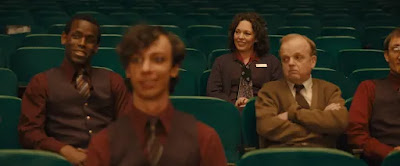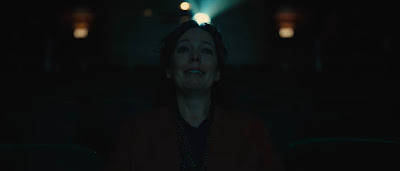or
"Check For Sleepers"
They say that every great film is a miracle—there is that magic "something" beyond the basics—the proverbial good script brought to life by great performances from actors well-cast and fit their roles like gloves. If you keep it in focus and the director doesn't try to do gymnastics with the camera to the point where you can't follow it, it's all good.
But, you need that spark, whether by design or accident, to make a great film.
Empire of Light, Sam Mendes' new film, aspires to that. But, it's not as illuminating as it wants to be.
Not for want of wattage, however. The performances are great—you expect that from Olivia Colman and Toby Jones and Colin Firth. And Mendes has a real "find" in Micheal Ward, who, though I'm sure he rehearsed and prepared and strategized for his role, does indeed have that magical spark that actors can't control—the camera loves him. It catches every thought that crosses Ward's face and communicates it clearly to the audience.No, the problem lies in the script—Mendes' own—in that it is trying to do too many things while trying to tie the issues into a metaphor for film that doesn't quite work. Oh, it makes a nice transitory thought, but it's a flawed metaphor that doesn't have the sprocket-holes to last an entire film.
It is 1980 in the coastal village of Margate and the Empire Cinema is a movie theater/former restaurant-bar-and-ballroom that is now reduced to just two large screen theaters. We meet Colman's character, Hilary, who is the manager of The Empire and has just returned—tentatively—from a medical leave where she was at a psychiatric hospital. Evidently, there was "an incident" and she was incarcerated against her will. That's the past. She's taking her Valium and all her co-employees welcome her back with the edge of "Yes, yes, we all know what she did" in the background.
But, she's back to it, albeit a bit shyly, but you have to wonder why she came back. She doesn't go to films—never has—and her boss, the rather oily Donald Ellis (Firth) is in the habit of asking her to talk in the office which usually ends up with a shag on his desk, nothing exciting and not even with enough energy to topple the picture of his wife sitting on it. Then, there's Norman the projectionist (Jones), who's just enough of an introvert that no one minds that he spends all his time in the booth tending to the spooling and un-spooling of films.
But, a big event is coming up—the Empire is going to be holding the local premiere of Chariots of Fire and it's going to be quite the to-do. Ellis staffs up with a new recruit hiring Stephen (Ward), a work-horse of a different color—he's black (everybody else is "pale"—it's England). But, Stephen is affable, cute, and gets along with everybody, and pretty soon he's ingratiated himself with the staff, who start to see him as Stephen, rather than "the black kid." Hilary is particularly taken with Stephen—after a brief dust-up—for his fascination with the grand old building they work in and the informed and tender way he treats a wounded pigeon he finds in The Empire's abandoned upper floor.This leads, impractically, (SPOILER ALERT) to an affair between the two where their genuine affection for each other turns physical. And to the complications that occur with a May-December romance when one of the participants self-isolates and is on mood-altering medications. One should not expect things to go smoothly, even with Lithium in the mix, but they'll go really south without it. Taking pills is not normal—unless you LIKE taking pills—and every dose reminds you of your weakness. And when "things are going good" there is the temptation to think "well, I don't need them now" and you stop taking them, like blithely taking a bottom piece out of a Jenga tower. Rinse and repeat. The Circle Game.
Which may be Mendes' point in a oddly circuitous way. At one point—when Hilary has crashed and gone back to hospital—there is a series of sequences where Toby Jones' Norman takes Stephen under his wing, showing him his sanctum of a projection booth and explaining "the trick" of the movies. They're just individual pictures running through the projector at 24 frames per second, each picture separated by a black border. But, due to a flaw in the human optic nerve, we don't see that black border, we only see the individual pictures rolling through, simulating the pace of real life. It's an illusion. It's magic. It's making the best out of a defect.The way Mendes ends the movie—with a celebration of change, an acknowledgement of seasons, the patterns of a life and a life cycle—makes the film-metaphor of bright/dark/bright/dark a little precious and makes me think that one of the side effects of the pandemic was making directors nostalgically contemplative (and forget that they're not working with film anymore—try and make a metaphor out of digital media!). It doesn't quite work. Nor does the sub-plot of Hilary toiling away at a movie theater and not wanting to watch movies.* What would cause such a preference, I wonder? And I came up with no explanations.
Nor did I "buy" that experiencing "the movies" would be such a glorious experience (even though I'm an obsessive about movies) that it would raise your spirits to curb—albeit briefly—a depressive's mood (despite the lessons of directors Preston Sturges and Woody Allen**). That trick doesn't always work, especially if you're going to a Bergman movie! No, movies are not cure-all's for what ails you. As one of my favorite Princess Bride lines goes: "Life is pain, Princess. Anyone telling you different is selling something." It may make them weepy at the Motion Picture Academy, but, then, they're selling something.
It just doesn't hang together. There are too many sub-plots and black-lines in the film to cross over for it to gel into a movie. But, on the plus side, any movie shot by Roger Deakins is worth watching at least once. And he never disappoints.
* Okay, I can understand this in a way. I used to work at a call-center, and the last thing I would want to do when I got home was talk to somebody on a phone. And despite the evidence I've seen, I continue to hold to the belief that somebody who works at McDonald's would prefer to eat at anyplace else but McDonald's. However, I've rarely seen a multi-plex employee not want to sit in on a movie...and do so.
* Okay, I can understand this in a way. I used to work at a call-center, and the last thing I would want to do when I got home was talk to somebody on a phone. And despite the evidence I've seen, I continue to hold to the belief that somebody who works at McDonald's would prefer to eat at anyplace else but McDonald's. However, I've rarely seen a multi-plex employee not want to sit in on a movie...and do so.
** We're thinking of Sullivan's Travels and Hannah and Her Sisters here.
Oh. And I am selling something. There's a discussion of the film here (on the weekly Lambcast) that I participated in. It's a podcast. Don't worry, you don't have to see me.










No comments:
Post a Comment